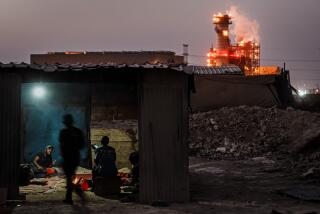Kuwaitis’ Bedouin Pride Damaged by Invasion : Mideast: Iraqi guns have burst the bubble of the rich lifestyle.
- Share via
DUBAI, United Arab Emirates — Their entrance is always impressive--in a London hotel, a Zurich business suite or in one of the sun-baked capitals of the Middle East.
A door swings open, and in stride three or four stern-faced men in gleaming white robes and flowing headdresses, their beards and mustaches neatly trimmed.
Kuwaitis.
The shoes are Bally and the watches Rolex. These are among the richest people in the world, per capita, and they move with a confident bearing.
It is a stereotype, but in many cases it is not far off the mark. The Kuwaitis have a Bedouin pride, and it has been hurt by Iraq’s invasion of their country.
A young college graduate who arrived in Dubai from London over the weekend found his Kuwaiti currency worthless as a result of the uncertainty brought on by the invasion.
“It is a humiliation I have never suffered before,” he told a local reporter.
Another arrival, Ali Mohammed, said he had been turned out by a London hotel that would not accept his credit card.
“I know London like the back of my hand,” he said. “So do many of my friends and relatives. We never dreamed that we would find ourselves in such straits, and it shook me to learn that the Londoners wouldn’t help us even for a few days.”
Mohammed was taken in by friends in Dubai.
Iraqi guns have burst the bubble of the Kuwaiti lifestyle, a government-subsidized existence that has made Kuwaitis the envy of the oil-rich Persian Gulf region. But the Kuwaitis have come through hard times before.
They are the descendants of a Bedouin clan that sailed up the Persian Gulf from the southwestern quarter of the Arabian Peninsula in the late 17th Century, and they occupy a small desert country of 6,880 square miles, squeezed between powerful neighbors, Iraq and Saudi Arabia.
They have been ruled by sheiks of the Sabah family for more than two centuries. Through periods of Turkish and British tutelage, Kuwait has grown on the fortunes of oil from a tiny port of fishermen, pearl divers and traders. Oil was discovered here in 1938, and oil revenues have built a welfare state that provides preschools and health services and subsidized housing for the small population.
Kuwaitis account for less than 1 million of the 2 million people in their country; the others were brought in to build the roads and office blocks of modern Kuwait, fill the professional and clerical ranks and work at the hotels and restaurants. Foreigners fill eight of 10 jobs.
The country has survived repeated territorial demands by Iraqi governments, a tumultuous war between Iran and Iraq that raged on its borders in the 1980s, and the disastrous collapse of its unregulated stock market in 1982.
Over the centuries, Kuwait’s culture has been shaped by its location. Arab and Persian influences have left their mark, and trade has given the Kuwaitis a cunning sense of commerce.
The people are strongly religious Muslims with a strain of desert wildness.
“Watch out, these fellows are absolutely mad,” a British expatriate warned a first-time visitor to the Kuwaiti capital as they drove along the seaside highway. Moments later their car was overtaken by a sleek Mercedes going 80 m.p.h. or more.
“That’s the ‘Bedu’ (Bedouin) in them,” he told his rattled passenger. “They’ve traded in their horses for high-powered cars.”
The Kuwaiti passion for action, well known at the casinos of London and Monaco, was the cause of the fall of the stock exchange. Kuwaitis were playing the market with postdated checks.
Yet these same men carry honor and responsibility in their main obligation, the commitment to their extended family. The family forms the Kuwaitis’ identity. The Kuwaiti family has been compared to the Chinese clan: It provides talent, connections and financial resources.
Any man or woman who brings dishonor to the clan through unseemly behavior is excluded, and without connections he or she is left adrift.
The men’s world rotates around the diwaniya, the all-male social gathering that takes place in the evening in a special room or outbuilding of the family home. Over tea or coffee, visitors play cards, watch videos and, as the evening draws on, talk politics and business.
When the ruling Sabah family shut down the Parliament in 1986, the political opposition went behind the doors of the diwaniya to map strategy for achieving a more democratic government.
“If you can work an invitation to a diwaniya, “ a foreign diplomat advised a visitor, “you will see the real Kuwait. There, public formality is set aside. They really let their hair down.”
The women’s lot is more constrained. Islamic modesty is observed, and few women leave home without covering their heads and wearing black robes.
Marriages are arranged, and the groom puts up a dowry, which brides often invest in gold or property, hedging against the unfortunate day when her husband may declare three times “I divorce thee” and she is out in the cold.
The Iraqi invasion, while long a possibility, has shattered the Kuwaitis’ composure. Tearful women, carrying photos of their self-exiled leader, Sheik Jabbar al Ahmed al Sabah, have mounted protest demonstrations in European capitals.
“I’m utterly disgusted at what’s happened,” a Kuwaiti woman stranded in Dubai said. “We never thought it would be carried out.”
More to Read
Sign up for Essential California
The most important California stories and recommendations in your inbox every morning.
You may occasionally receive promotional content from the Los Angeles Times.













